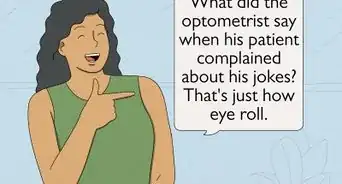This article was co-authored by wikiHow Staff. Our trained team of editors and researchers validate articles for accuracy and comprehensiveness. wikiHow's Content Management Team carefully monitors the work from our editorial staff to ensure that each article is backed by trusted research and meets our high quality standards.
This article has been viewed 81,224 times.
Learn more...
It's easy to kill a joke, whether you're the joke-teller or the person listening to the joke. As the joke-teller, your goal will be to tell the joke badly by doing things such as making mistakes while telling it or explaining why the joke is funny. As a listener, you can help ruin a joke by saying that you don't understand the joke, refusing to laugh, or taking the joke too seriously.
Steps
Telling a Joke Badly
-
1Choose an inappropriate time to tell the joke. This could be at an awkward dinner, right after a fight with someone, or any other time when it wouldn’t normally be a great time to be talking or laughing. Use your judgment to decide when the best (or more accurately, worst) time to tell the joke would be.[1]
- While telling the joke at an inappropriate time will help kill it, you should also prioritize being respectful of others—for example, you wouldn’t start telling jokes at a funeral.
-
2Make mistakes while telling the joke, causing you to start over. State some of the facts in the joke wrong, and start over each time, telling the entire joke from the beginning. Having to hear the same joke over and over again without actually getting to the punchline will make the person listening to the joke think it’s definitely not funny.[2]
- Start making mistakes about one-third or halfway through the joke so that you have to repeat the beginning of the joke over again.
- For example, say there are 3 characters instead of 5, a man is 65 years old instead of 45, or that someone travels to Egypt instead of Peru. Each time you make a mistake, start over with the right facts or make another mistake.
Advertisement -
3Add lots of embellishments to the joke. Most jokes are very minimal, only giving enough information for the punchline to be understood. Instead of telling the joke clearly and to the point, add on lots of extra details to make the telling of the joke last much longer.
- For example, if you’re telling a joke about a man who walks into a bar, give unnecessary details such as what the guy is wearing or what the bar looks like.
- Say something like, "A man walks into a small, dirty bar that's been around for 20 years wearing a red shirt and a green baseball cap with his socks pulled up to his knees."
-
4Explain why the joke is funny without being asked. Start doing this right after you’ve finished telling the joke, whether the person already understands the joke or not. Jokes aren’t meant to be explained, which is why talking about the punchline will ruin it.[3]
- For instance, if the joke is, “What does a nosey pepper do? Get jalapeno business,” you might then say, “Get it? It’s a nosey pepper, so it’s getting ‘all up in yo’ business, like ‘jalapeno.’”
- If the joke is a more complicated one, break down every detail of the joke to get to why it was supposed to be funny.
-
5Work on having bad timing while telling the joke. Many times telling a successful joke is all about how you say it, such as when you pause, the emphasis you put on certain words, and how well you execute the punchline. Do things such as telling the joke super slowly, too quickly, or a mixture of both.[4]
- Draw out the syllables of random words in the joke to put emphasis on unnecessary words, confusing the listener.
- When saying the punchline, use super exaggerated speech, or mumble the last sentence so that it’s difficult to understand what you’re saying.
-
6React too enthusiastically to your own joke. After you’ve told the joke, start laughing hysterically or asking others to tell you how funny the joke was. The best jokes are told without the joke-teller reacting, so by pretending as if you think you’re hilarious, the person listening to the joke will find it much less funny.[5]
- You could tell the listener something like, “Isn’t that so funny?” right after finishing the joke.
Ruining Someone Else’s Joke
-
1Say that you don’t understand the joke. Even if you do understand the joke, telling the joke-teller that you don’t get it will immediately kill the joke. No joke-teller wants to have to explain their joke—having to dissect your own joke makes it much less funny.[6]
- Right after the joke is done being told, say, "I don't get it," or "That joke doesn't make sense."
-
2Take the joke too seriously. Jokes are meant to be funny and make you laugh, so by treating the joke as something serious, you’re ruining any hope that the joke-teller had of receiving laughs. Tell the joke-teller that their joke isn’t funny, and then explain how it’s offensive or wrong.[7]
- For example, if the joke is, “A blind man walks into a bar. And a table. And a chair,” you could respond with, “It’s not nice to make fun of the blind.”
- You can also choose to take the joke personally, becoming offended by what the joke-teller is saying.
-
3Refuse to laugh after the punchline has been told. A joke that doesn’t receive any laughs tends to die instantly. By just staring at the person without laughing or smiling once they finish telling the joke, you’ll effectively ruin it.
-
4Blurt out the punchline to the joke being told, if you know it. Timing is super important for this, and it won’t work for all jokes. If you happen to already know the joke, saying the punchline before the joke-teller gets to it will defeat the entire purpose of the joke.[8]
- For example, if the joke is, “What do you call a fake noodle?” you would need to say “an impasta!” before the joke-teller is able to.
-
5Avoid responding to knock knock jokes with, “Who’s there?” Instead, if someone says, “knock knock,” respond with a phrase that doesn’t work with the joke. You might say something like, “Come in,” “what,” “how did you find my house,” or “no.”
Sample Ways to Ruin a Joke
Community Q&A
-
QuestionWhat can I do when someone roasts me?
 Community AnswerIf someone roasts you, you have to get them back. A little preparation isn't a problem at all, why not look some up?
Community AnswerIf someone roasts you, you have to get them back. A little preparation isn't a problem at all, why not look some up? -
QuestionWhat if it is a joke that they have told multiple times?
 Community AnswerIt kills the joke even more. Maybe even change the punchline so the joke does not make sense anymore. That will definitely kill the joke.
Community AnswerIt kills the joke even more. Maybe even change the punchline so the joke does not make sense anymore. That will definitely kill the joke. -
QuestionDo I need to know how to deliver a successful joke in order to understand how to kill one?
 Community AnswerKilling a joke doesn't necessarily require you to know how to tell a successful joke. However, just as delivering a joke successfully depends on timing, you can use a knowledge of timing and joke construction to kill it with precision.
Community AnswerKilling a joke doesn't necessarily require you to know how to tell a successful joke. However, just as delivering a joke successfully depends on timing, you can use a knowledge of timing and joke construction to kill it with precision.
References
- ↑ https://www.youtube.com/watch?v=dhtZcNr1g68
- ↑ https://www.youtube.com/watch?v=dhtZcNr1g68
- ↑ http://www.basicinstructions.net/basic-instructions/2018/4/17/how-to-retroactively-ruin-a-joke
- ↑ http://tvtropes.org/pmwiki/pmwiki.php/Main/DontExplainTheJoke
- ↑ http://www.basicinstructions.net/basic-instructions/2018/4/17/how-to-retroactively-ruin-a-joke
- ↑ http://tvtropes.org/pmwiki/pmwiki.php/Main/DontExplainTheJoke
- ↑ http://www.basicinstructions.net/basic-instructions/2013/10/20/how-to-kill-a-joke.html
- ↑ http://tvtropes.org/pmwiki/pmwiki.php/Main/DontExplainTheJoke
About This Article
Even if you’re really funny, you can kill a joke by telling it in the wrong way or at the wrong time. For example, you could tell the joke at an awkward dinner or after a fight, and it won’t seem as funny. Making a mistake or restarting the joke while you’re telling it will also kill the humor, as will adding unnecessary details during the story. If you want to kill someone else’s joke, say that you don’t understand it, pretend to be offended by the joke, or refuse to laugh. You could also blurt out the punchline before the joke-teller is able to. If you want to learn how to kill a joke by acting too serious, keep reading the article!








































































